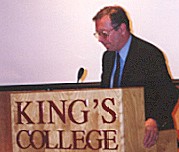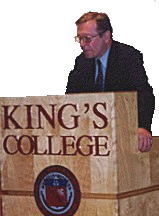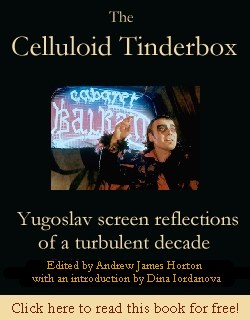Whilst Polish cinema is best known internationally for names such as Oscar-winning in Andrzej Wajda and the currently fashionable Krzysztof Kieślowski, one of the most important names in the country's film history—Krzysztof Zanussi—is less well-known to international audiences. This is despite the fact that he was a pioneer of the famous kino moralnego niepokoju (cinema of moral concern) trend in Polish cinema in the 1970s and early 80s.
In a brave attempt to rectify this, earlier this year King's College in Wilkes-Barre, Pennsylvania, for its second annual Lidia and Francis Kopernik lecture on Polish culture, invited Zanussi to speak about his life and work. In preparation for the lecture, the college showed three of Zanussi's films.
Bleak times
One of Zanussi's best known films is his striking debut, Struktura kryształu (The Structure of Crystals, 1969). From the first shot, the film is bleak: in its use of black and white; its setting of a snowy, frozen wasteland; the austerity of the lives of Jan and Anna; a stark soundtrack; and what appears to be a deliberate underexposure of the film—an effect highlighted by a clip from a film the characters see as part of the action which is clearer and brighter than the rest of the film.
The aesthetic bleakness of the film mirrors the bleakness of life under Communism, which Zanussi was among the first generation of Poles to grow up in. 1969 was a particularly unhappy year, even by the standards of Poland under Communism. There were long queues for meat and a fatigue and disillusionment with the leadership of Władysław Gomułka in whom Poles had enthusiastically placed their trust just a decade earlier to create a "Polish Road" towards Socialism.
In March 1968, sporadic street fighting, lasting a period of weeks and taking place across the country between university students and government heavies, had given rise to a feeling that reform of the Party from the inside was no longer possible and that the role of the intellectual as the vanguard in political and social reform was now discredited.
Old friends
The film reflects all this bleakness and despair, and indeed the whole plot constitutes a questioning of how intellectuals should function in society in the form of a reunion at an isolated weather station between two contemporaries at college who have not met for some time.
Marek is a worldly-wise physics professor; he has been to the United States and seen the good life and all its wonders and has the slides to prove. He has also been to the Soviet Union and seen what may be a worse brand of Communism than that which exists in Poland. His slides show this good life.
Jan seems content with his quiet, simple life, spent in a remote area checking weather instruments, running through the snow, and visiting an ancient cemetery. But is he really happy? Marek senses Jan's underlying depression and tries to talk him into returning to the university in Warsaw, but Jan will have none of it.
His wife, Anna, seems to be more attracted to the possibility of a better life. She grew up in the area of the weather station and so knows nothing better. Marek's depiction of life in the outside world as glamorous, attracts her to Marek as much as to his stories. They flirt with each other and come close to having an affair, but she eventually pushes him away. As she and her husband watch Marek drive away, she too seems content with things as they are.
This contentment with things as they are, this complacency, is the real danger of Communism. Speaking about kino moralnego niepokoju in his lecture, Zanussi warned of the necessity of confronting evil, saying that silence in the face of evil is tantamount to cooperating with evil. Although this comment was said in relation to a different phase of Zanussi's career, it is a revealing tangential comment on a film made at a time when all hope of changing the political system seemed impossible.
A dark picture of better times
Whilst the bleakness of Struktura kryształu comes from the pallor of its images Życie rodzinne (Family Life, 1971) derives its atmosphere from dark cinematography. Most of the scenes were shot inside, apparently using natural light, of which there is frequently not much. This created a very gloomy and claustrophobic atmosphere.
Although made only two years later than Struktura kryształu, Życie rodzinne is the product of a different era. Gomułka had fallen in 1970 and Edward Gierek had become First Secretary of the Communist Party. Gierek tried to escape from the dreary Poland that Gomułka's policies had created and set out trying to improve standards of living. Real wages rose, Poland brought a license to manufacture Fiat cars for consumers and the Party even (for a while) allowed state support to be given to private farmers in order to boost food production.
But Poles were suspicious. They had been promised the earth by the Party before—not least by Gomułka—and Gierek's rhetoric was no different. In this context, the sense of entrapment and enclosure in Życie rodzinne is all the more significant. The faded grandeur of the family mansion in which the bulk of the action takes place reflects the lower quality of life under Communism. For all the dynamism that Gierek brought to Poland, Communism is still something that stifles and brings poverty.
While a theme of Struktura kryształu is rescue from the quiet secluded life, a theme here is escape. Everyone seems to be escaping or trying to escape: Wit (Daniel Olbrychski) has escaped his family to a new city and a

|
Despite all the attempts to escape and the confrontation of personalities that take place throughout the film, it ends with the status quo pretty much preserved. The only real effects have been negative: Wit, in trying to improve his relationship with his family, destroys his relationship with his friend.
The film is, arguably, a critique of the numbing power of Communism and its ability to convince people that the best reaction to life under the regime is to retreat and escape. Indeed, it admirably illustrates the principles of totalitarianism in action, with resistance to the system reduced to aimless individual action that isolates those who attempt it.
Musical odyssey
Dotknięcie ręki (The Silent Touch, 1992) was the most accessible of the three to a mass audience in that it was in color, in English and had a more modern feel than the previous two works. The film is about Stefan, a young Polish musicologist who, after a dream in which he hears a fragment of a tune, becomes convinced that an elderly, reclusive and alcoholic composer living in retirement still has his best work to come.
Stefan's effort to realize the grand symphony he has heard in his mind is Herculean. He travels abroad to visit the composer, Henryk Kezdi (played by Max von Sydow), overcomes the old man's bitterness, persuades him to stop drinking and gets him to return to the piano and manuscript paper in hand. All this persistence pays off in the end when a great symphony is completed and performed.
Or was it all worth it in the end? Stefan does not seem to appreciate the result of all hard work�burying his head in his pillow as he listens to the performance on the radio. The audience are not too appreciative either, with some walking out half-way through the performance.
In the end, Stefan returns to his homeland to teach, and Kezdi goes back to his old ways. But this time, Kezdi has an infant son, who seems to symbolize the possibilities of life ahead.
Fruitless travel and forgiveness
These three, in some ways very different, films all had a number of themes of in common. First, they all involved a journey. In Struktura kryształu, Marek travels to the meteorological station to visit his friend. In Życie rodzinne, Wit goes to his parents' home. And in Dotknięcie ręki, Stefan makes the most ambitious journey of all three, traveling from Poland to Denmark. In all these journies, Zanussi portrays the common human philosophy of "the grass is always greener on the other side of the fence," and none of the trips actually seem to achieve what they set out to, thus proving the validity of the old adage.
But Zanussi is not a pessimist. His films suggest that we should engage with life and work on improving our present lot, rather than retreating or indulging in fantasies about unobtainable realities.
In his lecture, Zanussi was keen to advocate these principles in the form of forgiveness. He said, regarding Communism and especially the Russians and the
 |
| Zanussi at the lecturn |
Zanussi's own life has been one in which a fair degree of forgiveness has been necessary. His early years took place in the shadow of a terrible menace: that he might be kicked out of school forever at age 11, because of a "small, ridiculous, stupid incident."
Since, like any artist, he said his words are just a substitute for his art and that his images, his films are his voice, he then showed a clip from his autobiographical film Cwał (At Full Gallop). The clip dramatizes this "stupid" incident, in which a classmate turns him in to the school's headmaster because he was reading forbidden books. His mother saves him from being kicked out of school.
Reiterating his theme of forgiveness, the director pointed out that, "Although the boy in the picture at the time was an adversary, we are now colleagues of sorts and have no animosity. The film is a reflection of the moral condition of society in Central Europe. In historical and practical terms, forgiveness is what's really important." Furthermore, he stated, "Forgiveness is more of what we need in society. It is important to move on. This is the most practical solution."
Another illustration of forgiveness was the story of a former state censor who visited Zanussi after the fall of Communism. In the past, the man had read Zanussi's letters and listened in on his phone conversations. Now he wanted Zanussi to give him a job. The director offered him the job of working in his garden.
Concluding, Zanussi held out hope for the future. He stated that "in the new century (whether it begins this year or next year), we must find a way to get around without our bruises and imperfections. My hope is that the twenty-first century is the century when we have a return to deeper spirituality, that will give us inspiration for moral growth, to allow forgiveness. The twentieth century was awful. Let's hope the twenty-first will be better."
Ron Breznay, 18 September 2000
Moving on:
- Browse through the CER eBookstore for other electronic books
- The Kinoeye Archive of articles on CEE film
- Buy English-language books on CEE film through CER
- Return to CER front page





